-
01-01-2016
ERRATUM
Revista Brasileira de Enfermagem. 2016;69(1):206-206
Abstract
ERRATUM
Revista Brasileira de Enfermagem. 2016;69(1):206-206
DOI 10.1590/0034-7167.20166901e02
Views0In the article “Conceptions of mid-level nursing professionals facing those with a chemical dependency”, with the number of DOI: 10.1590/0034-7167.2015680610i, published in the journal Revista Brasileira de Enfermagem, v68(6):755-60, page 760 that read: “8. Vargas D, Soares J. Knowledge and attitudes of nurses towards alcohol and related problems: the impact of an educational intervention. Rev […]See more -
01-01-2016
ERRATUM
Revista Brasileira de Enfermagem. 2016;69(1):205-205
Abstract
ERRATUM
Revista Brasileira de Enfermagem. 2016;69(1):205-205
DOI 10.1590/0034-7167.20166901e01
Views0In the article “Using the theory of meaningful learning in nursing education”, with the number of DOI: 10.1590/0034-7167.2015680420i, published in the journal Revista Brasileira de Enfermagem, v68(4):626-35, page 627 that read:“Ausubel was descended from Jewish, born in New York in 1918 and died in 1994 at the age of 75. He thought and wrote until […]See more -
01-01-2016
Nursing process documentation: rationale and methods of analytical study
Revista Brasileira de Enfermagem. 2016;69(1):197-204
Abstract
Nursing process documentation: rationale and methods of analytical study
Revista Brasileira de Enfermagem. 2016;69(1):197-204
DOI 10.1590/0034-7167.2016690126i
Views0See moreABSTRACT
Objective:
to describe the methods used to analyze the associations between variables of service, nursing and the nursing process documentation in institutions of the Department of Health of the State of São Paulo.
Method:
multilevel analytical study with data obtained in the domains of institution, units of the institution and nursing professionals who work there, using standardized instruments. The analyses had as axis the degree of completeness of the nursing process documentation in units or institutions and their association with variables of nursing personnel, of units and of institutions.
Conclusion:
This study will provide important empirical evidence on the factors involved in the nursing process documentation.
-
01-01-2016
Qualitative methodologies in health research: interpretive referential of Patricia Benner
Revista Brasileira de Enfermagem. 2016;69(1):192-196
Abstract
Qualitative methodologies in health research: interpretive referential of Patricia Benner
Revista Brasileira de Enfermagem. 2016;69(1):192-196
DOI 10.1590/0034-7167.2016690125i
Views0See moreABSTRACT
Objective:
this article reports on the experience of using the interpretive phenomenological framework of Patricia Benner in a Brazilian context. Benner’s interpretive phenomenology, based on existential and interpretative philosophy, aims to understand human experiences in the particular worlds of research participants. Data were collected through interviews with nine nurses in November and December 2014.
Results:
data analysis process according to Benner’s framework consisted of: transcription, coding, thematic analysis, and search for paradigmatic cases and examples. Therefore, the prior knowledge of the researcher is an important part of the study, consisting in manners of the research conduction.
Conclusion:
The use of this methodological framework entailed a great challenge for the researcher, however, it also enabled a unique opportunity to illuminate important existential phenomena related to the daily lives of research participants.
-
01-01-2016
Nurses’ performance on primary care in the National Health Service in England
Revista Brasileira de Enfermagem. 2016;69(1):182-191
Abstract
Nurses’ performance on primary care in the National Health Service in England
Revista Brasileira de Enfermagem. 2016;69(1):182-191
DOI 10.1590/0034-7167.2016690124i
Views0See moreABSTRACT
Objective:
To analyze the expansion of nursing roles in primary care in the English National Health Service and the implications for professional practice.
Method:
qualitative research in case study format, held in London, England, in six primary care units. Data were obtained through interviews with nine nurses. After the thematic data analysis, two units emerged: the nurses’ performance characteristics and effects of the expansion of nursing roles.
Results:
expansion of nurses’ roles: consultation, diagnosis and drug therapy, case management and monitoring of chronic conditions. Repercussions: for the user, there was improved access, communication and comprehensive care, increased duration of consultations, resulting in greater adherence; for nurses, there was the expansion of professional skills, knowledge and professional recognition; to the health care system, it resulted in cost savings.
Conclusion:
benefits in expanding nursing roles, were visible, contributing to primary care quality.
-
01-01-2016
Meleis’ Nursing Theories Evaluation: integrative review
Revista Brasileira de Enfermagem. 2016;69(1):174-181
Abstract
Meleis’ Nursing Theories Evaluation: integrative review
Revista Brasileira de Enfermagem. 2016;69(1):174-181
DOI 10.1590/0034-7167.2016690123i
Views0See moreABSTRACT
Objective:
to analyze the application of the theory evaluation model proposed by Meleis in Brazilian studies.
Method:
integrative review of online articles published from 2002 to 2012 in the databases LILACS and BDENF.
Results:
the 16 selected studies confirmed the use of only three of the five stages proposed for Meleis’ theories analysis: Description of the Theory, Criticism of the Theory and Analysis of the Theory, with a predominance of a single unit of analysis in each.
Conclusion:
the analysis of nursing theories provides support to nurses in the practice, research, education and administration of the different dimensions of care. Meleis’ model figures as very important by contributing to the development of knowledge of nursing discipline, considering that its use as a method allows several reflections on theories in order that they be revalidated to support a more theoretical and practical applicability.

-
01-01-2016
Clinical indicators of sexual dysfunction in pregnant women: integrative literature review
Revista Brasileira de Enfermagem. 2016;69(1):165-173
Abstract
Clinical indicators of sexual dysfunction in pregnant women: integrative literature review
Revista Brasileira de Enfermagem. 2016;69(1):165-173
DOI 10.1590/0034-7167.2016690122i
Views0See moreABSTRACT
Objective:
to identify the nursing diagnosis clinical indicators of sexual dysfunction in pregnant women.
Method:
it is an integrative literature review, with research in databases using the keywords “sexual*”, “pregnan*” and “function*”. Studies included had an abstract available for analysis, referring to pregnant women over 18 years old, written in Portuguese, French, Spanish and English, with publication date between 2010 and 2014. Studies that reporting pregnant women with an associated pathology were excluded.
Results:
sexual dysfunction in pregnant women is consistent in the literature. Nine defining characteristics were identified and 16 related factors, some not classified in NANDA International.
Conclusion:
clinical indicators can be added to the nursing diagnosis to favor an accurate diagnosis and effective interventions in the surveillance of pregnancy as a period of healthy sexual experience.

-
01-01-2016
Conditions of functional health literacy of an elderly diabetics group
Revista Brasileira de Enfermagem. 2016;69(1):156-164
Abstract
Conditions of functional health literacy of an elderly diabetics group
Revista Brasileira de Enfermagem. 2016;69(1):156-164
DOI 10.1590/0034-7167.2016690121i
Views0See moreABSTRACT
Objective:
to evaluate the conditions of functional health literacy of an elderly diabetics group.
Method:
cross-sectional and descriptive study, with diabetic’s elderly assisted in the SUS (N = 114). The social and health conditions were evaluated as well as functional health literacy by S-TOFHLA test (short version); the simple proportions, average, standard deviation and Pearson’s Chi-square were described by SPSS software (20.0) with α = 5% value.
Results:
the mean age was 67.4 years, 74.0% of the elderly were women, had up to four years of schooling; 29.8% had a long-standing illness, 64.0% reported having high blood pressure, 47.4% smoke or were smokers, 73.7% had low functional health literacy, which was associated with schooling p = 0.001.
Conclusions:
the low functional health literacy could be a self-care conditioning and can be influenced by low schooling because it implies to have skills to understand and make decisions aimed at self-management of health.
-
06-01-2015
Health promotion in supplementary health care: outsourcing, microregulation and implications for care
Revista Brasileira de Enfermagem. 2015;68(3):482-489
Abstract
Health promotion in supplementary health care: outsourcing, microregulation and implications for care
Revista Brasileira de Enfermagem. 2015;68(3):482-489
DOI 10.1590/0034-7167.2015680315i
Views1See moreABSTRACT
Objective:
to analyze health promotion programs in the supplementary health care.
Methods:
This was a multiple case study with a qualitative approach whose data were obtained from interviews with coordinators of providers contracted by the corporations of health insurance plans in Belo Horizonte, Minas Gerais. The data were submitted to Critical Discourse Analysis.
Results:
Home care has been described as the main action in the fi eld of health promotion transferred to the providers, followed by management of patients and cases, and the health education.groups. The existence of health promotion principles is questionable in all programs. Outsourcing is marked by a process with a division between cost and care management. Implications of this process occur within admission and interventions on the needs of the benefi ciaries.
Conclusions:
Statements revealed rationalization of cost, restructuring of work, and reproduction of the dominant logic of capital accumulation by the health insurance companies.

-
ORIGINAL ARTICLE01-01-2019
Knowledge and behavior of professionals about bundled strategies of central venous catheter
Revista Brasileira de Enfermagem. 2019;72(1):50-56
Abstract
ORIGINAL ARTICLEKnowledge and behavior of professionals about bundled strategies of central venous catheter
Revista Brasileira de Enfermagem. 2019;72(1):50-56
DOI 10.1590/0034-7167-2018-0164
Views1See moreABSTRACT
Objective:
To investigate the factors that influence the knowledge and behavior of professionals of neonatal and pediatric units about bundled strategies of insertion of central venous catheter.
Method:
This is a cross-sectional study, conducted in one neonatal and one pediatric intensive care units in a public hospital in Belo Horizonte, Brazil, from April to July, 2016. The sample consisted of 255 professionals who answered a structured instrument. Descriptive and comparative analyses were made using the SPSS software.
Results:
The category nursing professional (p = 0.010), working hours of 12×36 scale (p < 0.001), training as a form of acquiring knowledge (p < 0.001) and participation in training programs (p < 0.001) are associated to greater knowledge about the bundle. Regarding behavior, no significant associations were observed.
Conclusion:
The study showed that there are factors that influence the knowledge about bundled strategies of insertion of central venous catheter, reflecting the need to consider these practices for making more effective educational practices in health care.
-
ORIGINAL ARTICLE12-13-2019
Factors associated with low Apgar in newborns in birth center
Revista Brasileira de Enfermagem. 2019;72:297-304
Abstract
ORIGINAL ARTICLEFactors associated with low Apgar in newborns in birth center
Revista Brasileira de Enfermagem. 2019;72:297-304
DOI 10.1590/0034-7167-2018-0924
Views1See moreABSTRACT
Objective:
to analyze factors associated with Apgar of 5 minutes less than 7 of newborns of women selected for care at the Center for Normal Birth (ANC).
Method:
a descriptive cross-sectional study with data from 9,135 newborns collected between July 2001 and December 2012. The analysis used absolute and relative frequency frequencies and bivariate analysis using Pearson’s chi-square test or the exact Fisher.
Results:
fifty-three newborns (0.6%) had Apgar less than 7 in the 5th minute. The multivariate analysis found a positive association between low Apgar and gestational age less than 37 weeks, gestational pathologies and intercurrences in labor. The presence of the companion was a protective factor.
Conclusion:
the Normal Birth Center is a viable option for newborns of low risk women as long as the protocol for screening low-risk women is followed.
-
ORIGINAL ARTICLE04-09-2020
Factors associated with the discontinuance of outpatient follow-up in neonatal units
Revista Brasileira de Enfermagem. 2020;73(3):e20180793
Abstract
ORIGINAL ARTICLEFactors associated with the discontinuance of outpatient follow-up in neonatal units
Revista Brasileira de Enfermagem. 2020;73(3):e20180793
DOI 10.1590/0034-7167-2018-0793
Views1See moreABSTRACT
Objectives:
to identify predisposing and enabling factors as well as the health needs associated with the discontinuance of outpatient follow-up of newborns who were hospitalized at neonatal intensive care unit.
Methods:
cross-sectional study, using the behavioral model of health services use. The study was composed of 358 mothers and newborns referred to the outpatient follow-up after discharge. Characterization, perception of social support, postnatal depression, and attendance to appointments data were collected, analyzed by the R software (3.3.1).
Results:
outpatient follow-up was discontinued by 31.28% of children in the first year after discharge. In multiple regression analysis, the chance of discontinuance was higher for newborns who used mechanical ventilation (OR = 1.68; 95%CI 1.04-2.72) and depended on technology (OR = 3.54; 95%CI 1.32-9.5).
Conclusions:
predisposing factors were associated with the discontinuance of follow-up; enabling factors and health needs did not present a significant association. Children with more complex health conditions require additional support to participate in follow-up programs, thus ensuring the continuity of care.

-
ORIGINAL ARTICLE02-22-2021
Analysis of vaccine loss due to temperature change
Revista Brasileira de Enfermagem. 2021;74(1):e20190762
Abstract
ORIGINAL ARTICLEAnalysis of vaccine loss due to temperature change
Revista Brasileira de Enfermagem. 2021;74(1):e20190762
DOI 10.1590/0034-7167-2019-0762
Views1See moreABSTRACT
Objectives:
to analyze vaccine losses in a Health Region in the Northwest of São Paulo.
Methods:
retrospective cross-sectional study with secondary data obtained from Temperature Change Notification Forms used by the Epidemiological Surveillance Group XXIX of São José do Rio Preto between 2010 and 2017. Descriptive and inferential analysis were performed using multiple linear regression and significance level of 95%.
Results:
in total, 341 notifications of temperature changes were analyzed, of which 70.1% were caused by structural reasons, 57.8% in industrial refrigerators and 91.2% in primary care services. Of the doses that suffered a change in temperature, 41.4% were lost and 58.6% were administered to the population. The highest percentage of lost doses compared to those applied occurred in smaller municipalities, although they reported less.
Conclusions:
nursing workers who work in vaccination rooms should make efforts to prevent temperature changes and avoid losses and higher public expenses.
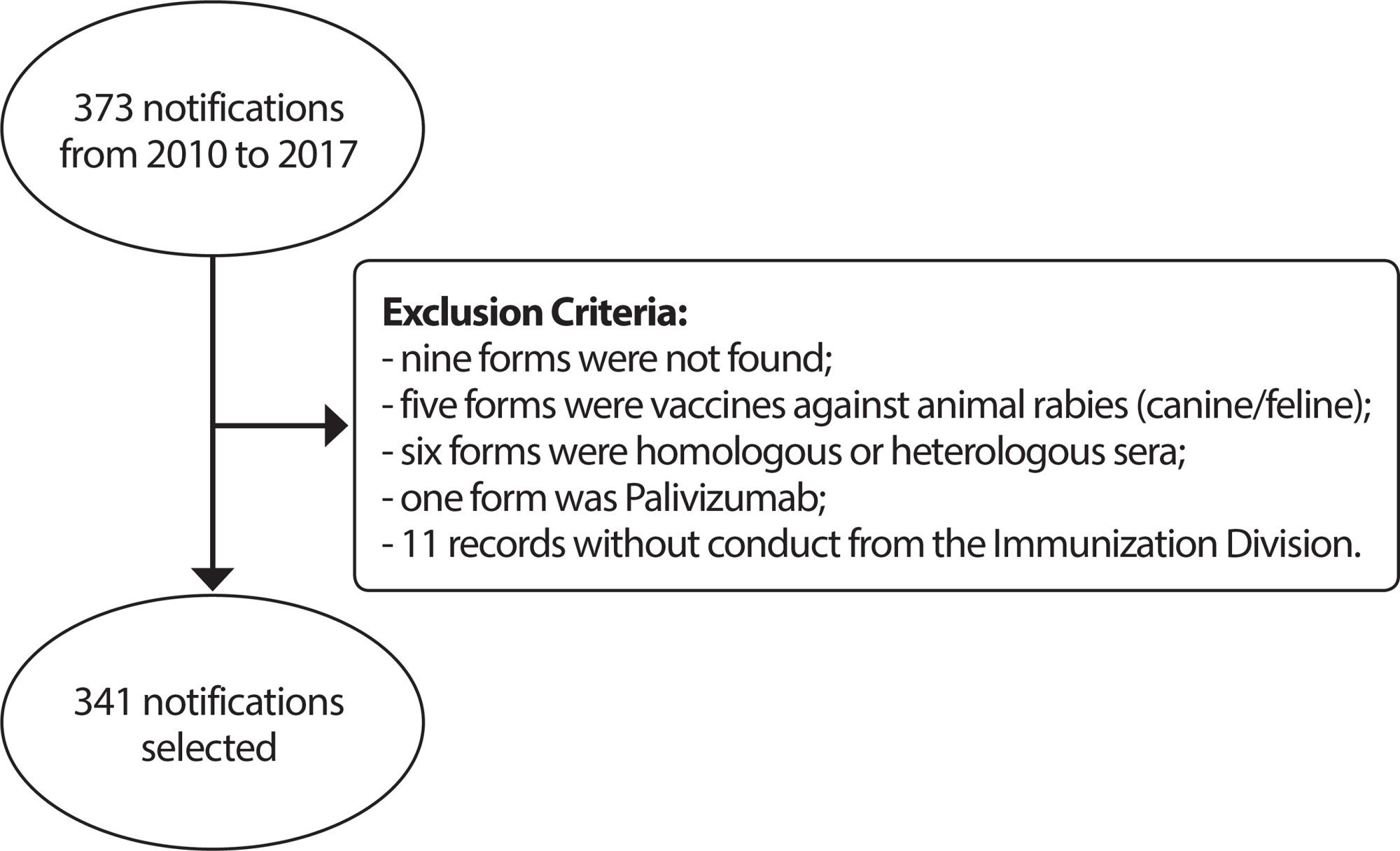
-
ORIGINAL ARTICLE09-26-2022
Participatory development of educational technology in seeking patient safety in maternity hospitals
Revista Brasileira de Enfermagem. 2022;75(5):e20210701
Abstract
ORIGINAL ARTICLEParticipatory development of educational technology in seeking patient safety in maternity hospitals
Revista Brasileira de Enfermagem. 2022;75(5):e20210701
DOI 10.1590/0034-7167-2021-0701
Views1See moreABSTRACT
Objectives:
to develop a booklet as an educational technology, together with health professionals, patients and companions, aiming at their involvement in patient safety in maternity hospitals.
Methods:
a qualitative convergent care study, carried out in three stages at a maternity hospital in Belo Horizonte. The booklet construction took place between February and April 2021, with 13 professionals, 06 companions and 11 patients.
Results:
data content analysis was performed, creating three categories: Knowledge and experiences about patient and newborn safety in maternity hospitals; Challenges for involving patient and companion in safety actions; Assessment of patients, companions and professionals on the booklet construction process. The booklet construction involved the participation of health professionals, users and companions in all stages of the process.
Final considerations:
the participatory process enabled the creation of educational technology for the involvement of patients and companions in patient safety actions.
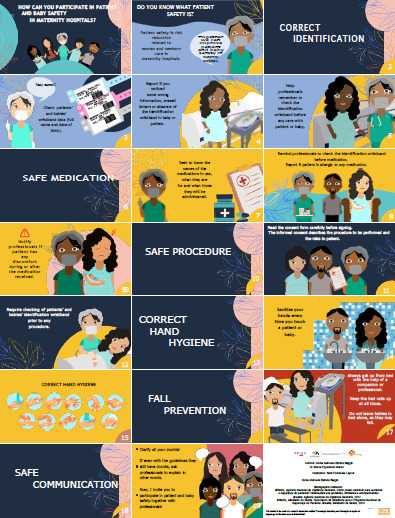
-
12-08-2023
Nursing experiences in specialized services in child and adolescent mental health: a systematic review of qualitative studies
Revista Brasileira de Enfermagem. 2023;76:e20220550
Abstract
Nursing experiences in specialized services in child and adolescent mental health: a systematic review of qualitative studies
Revista Brasileira de Enfermagem. 2023;76:e20220550
DOI 10.1590/0034-7167-2022-0550
Views1See moreABSTRACT
Objective:
to synthesize evidence from qualitative studies on nursing experiences regarding child and adolescent mental health care in specialized services.
Method:
a systematic review with meta-synthesis of qualitative studies according to JBI guidelines. CINAHL, EMBASE, MEDLINE, LILACS, PSYCinfo, Scopus and Web of Science databases were used. The findings were classified according to the level of reliability and credibility and categorized by similarity between contents.
Results:
229 articles were identified, and five were included in the final sample and organized into the categories: Emotional impact; and Understanding nursing role. The level of evidence found was moderate.
Final considerations:
nursing experiences are permeated by emotional exhaustion, feelings of frustration and difficulty in understanding their professional role. The need for training spaces that qualify this care is highlighted.

-
ORIGINAL ARTICLE07-19-2024
Validation of an instrument for assessing leprosy care in children and adolescents
Revista Brasileira de Enfermagem. 2024;77(2):e20230344
Abstract
ORIGINAL ARTICLEValidation of an instrument for assessing leprosy care in children and adolescents
Revista Brasileira de Enfermagem. 2024;77(2):e20230344
DOI 10.1590/0034-7167-2023-0344
Views1See moreABSTRACT
Objectives:
to validate the content of an instrument for assessing leprosy care in individuals under 15 years old in the context of Primary Health Care.
Methods:
methodological study of content validation, based on the evaluation of essential and derived attributes in primary care, in the professional version. For data analysis, the Content Validation Index (CVI ≥ 0.8) and Cronbach’s Alpha were calculated.
Results:
a higher percentage of judges among nurses (61.5%) was observed; with a doctorate (46.2%), and engaged in teaching and research (77%). The overall Content Validation Index of the instrument was 0.98. In the analysis of Cronbach’s Alpha of the instrument, the assigned value was 0.717.
Conclusions:
the instrument represents an advancement in the measurement of health evaluation policies and can significantly contribute to improving the quality of care provided to children and adolescents with leprosy.
-
REVIEW07-29-2020
Frailty syndrome in the elderly: conceptual analysis according to Walker and Avant
Revista Brasileira de Enfermagem. 2020;73:e20190601
Abstract
REVIEWFrailty syndrome in the elderly: conceptual analysis according to Walker and Avant
Revista Brasileira de Enfermagem. 2020;73:e20190601
DOI 10.1590/0034-7167-2019-0601
Views0See moreABSTRACT
Objective:
To analyze the concept of “frailty syndrome” in the literature, according to the method proposed by Walker and Avant.
Methods:
It is a concept analysis, guided by the method proposed by Walker and Avant, made operational through an integrative literature review. The search in a scientific database was carried out using the descriptors: Frail elderly, syndrome, phenotype, geriatric assessment, and aging. The literary corpus comprised 66 studies. Results: The study found the antecedents and attributes (categorized as physical, sociodemographic, and behavioral/environmental) that integrate the signs and symptoms evidenced in the “frailty syndrome,” as well as the consequences of this concept. The variables were analyzed with emphasis on the conceptions that influence the frailty process of the elderly.
Conclusion:
The study demonstrated the complexity arising from the multifactorial genesis of the referred syndrome, emphasizing the specificities of the elderly’s frailty. However, we recommend conducting further research involving the phenomenon in question to understand the construct better.
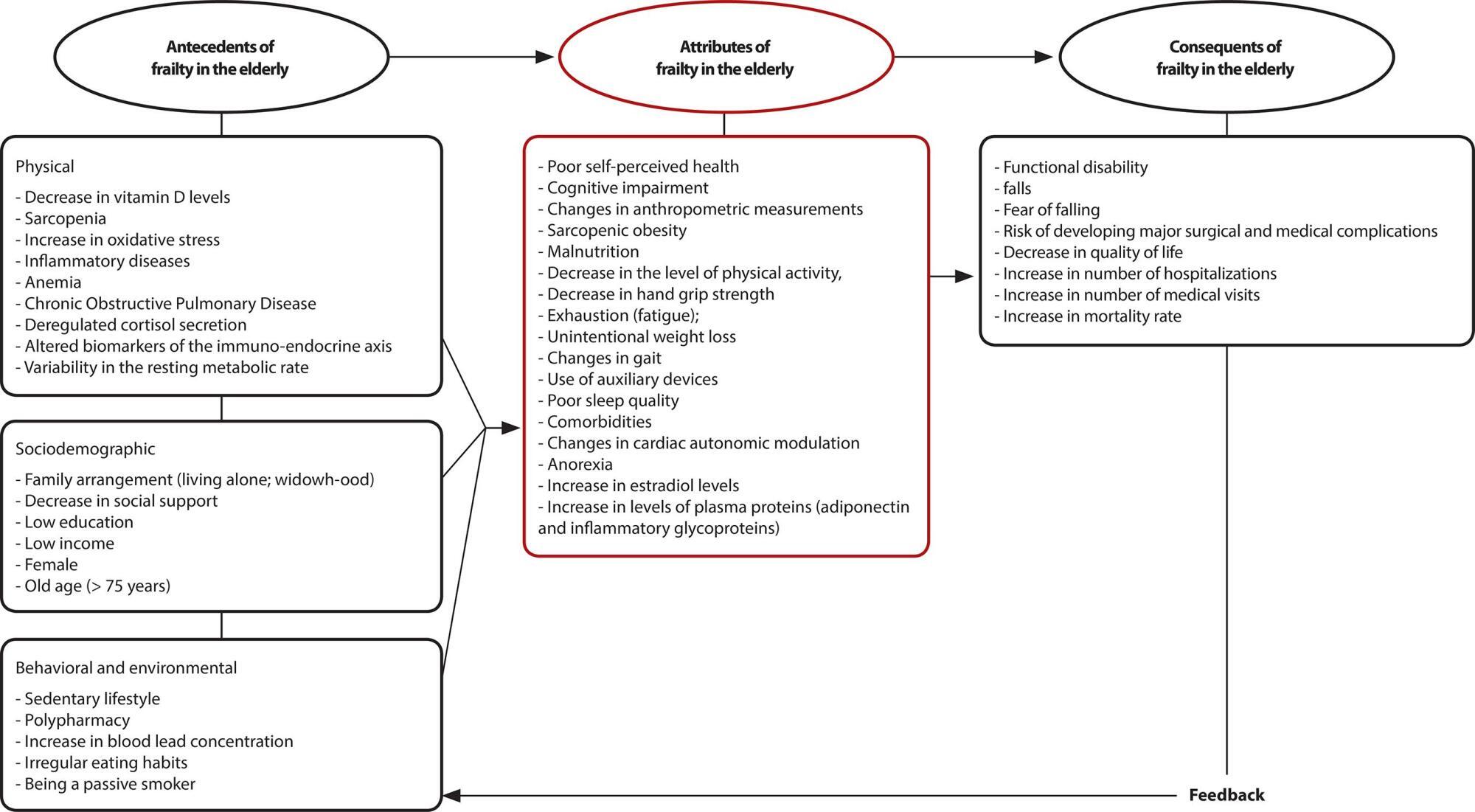
-
ORIGINAL ARTICLE09-16-2019
Tuberculosis: health care and surveillance in prisons
Revista Brasileira de Enfermagem. 2019;72(5):1304-1310
Abstract
ORIGINAL ARTICLETuberculosis: health care and surveillance in prisons
Revista Brasileira de Enfermagem. 2019;72(5):1304-1310
DOI 10.1590/0034-7167-2018-0260
Views0See moreABSTRACT
Objective:
To identify tuberculosis-related health care and surveillance actions in Prison Health Units.
Method:
Cross-sectional study, of quantitative, exploratory and descriptive character. We visited 13 Teams of Prison Health, and nurses and technicians were interviewed regarding epidemiological surveillance instruments, physical structure and materials.
Results:
Search for respiratory symptoms in admission was reported by 6 (46.2%) of the teams, and the smear microscopy was the most requested test. The Logbook of Respiratory Symptoms and the Logbook for Monitoring Tuberculosis Cases were used in 7 (53.8%) institutions. Two of them (15.4%) had a location for sputum collection and 1 (7.7%) had a radiographer. The Directly Observed Therapy was reported in 7 (53.8%) units.
Conclusion:
Health care actions related to the search for respiratory symptoms and Directly Observed Therapy should be expanded, as well as surveillance actions and recording in official documents of the National Tuberculosis Control Program.
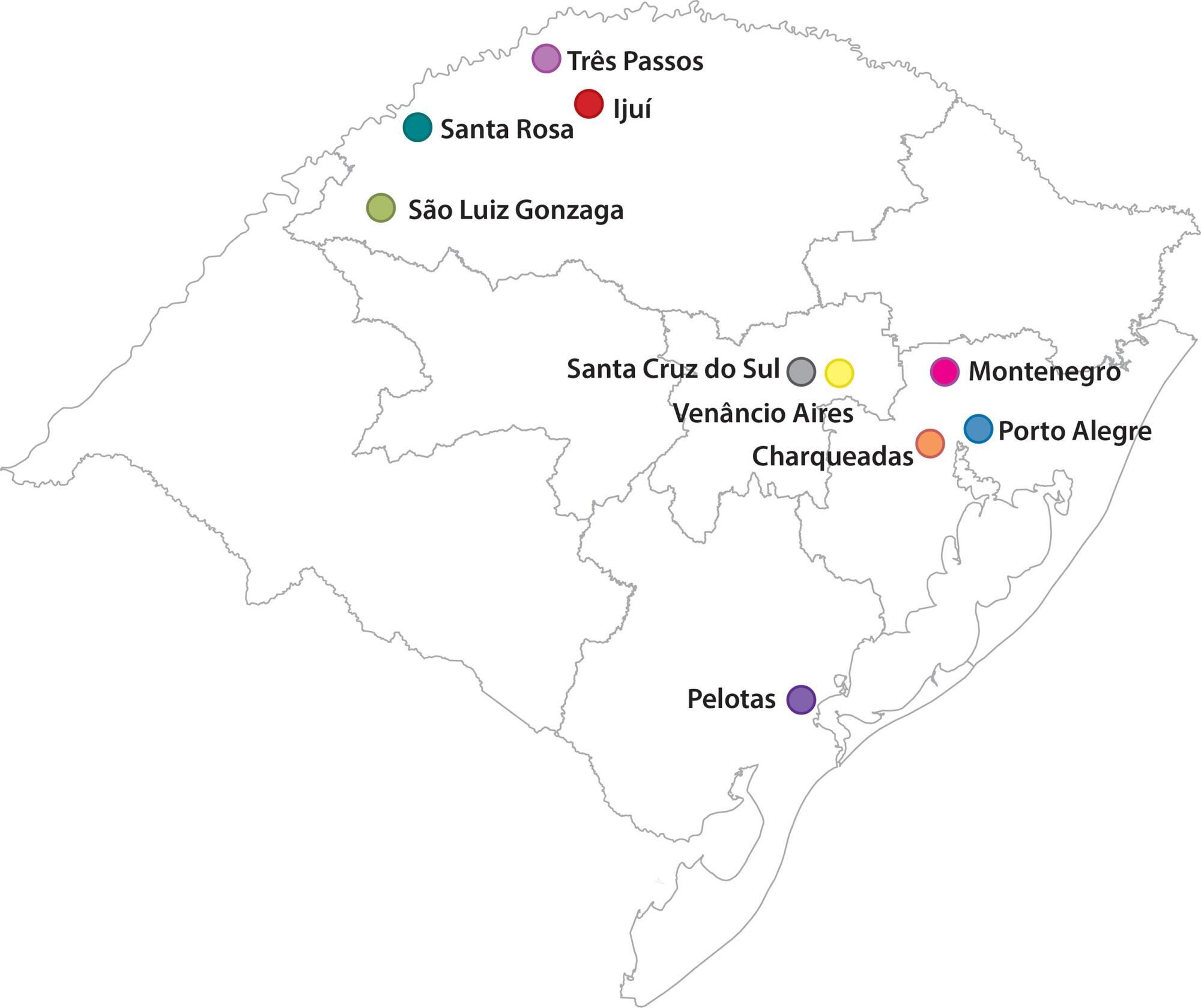
-
04-14-2021
COVID-19 patients in prone position: validation of instructional materials for pressure injury prevention
Revista Brasileira de Enfermagem. 2021;74:e20201185
Abstract
COVID-19 patients in prone position: validation of instructional materials for pressure injury prevention
Revista Brasileira de Enfermagem. 2021;74:e20201185
DOI 10.1590/0034-7167-2020-1185
Views0See moreABSTRACT
Objective:
to perform the content and face validation of a checklist and a banner on pressure injury prevention in patients in prone position.
Method:
this is a methodological study of content and face validation with 26 nurses with specialization. Professionals assessed the checklist and the banner in relation to clarity, theoretical relevance, practical relevance, relation of the figures to the text and font size. The Content Validity Index was calculated for each item, considering one with a value equal to or greater than 0.8 as valid.
Results:
all the actions described in the checklist and in the banner had a Content Validity Index greater than 0.80, with standardization of verbal time and esthetic adjustments in the banner’s layout, as suggested.
Conclusions:
the checklist and the banner were validated and can be used in clinical practice to facilitate pressure injury preventions in patients in prone position.
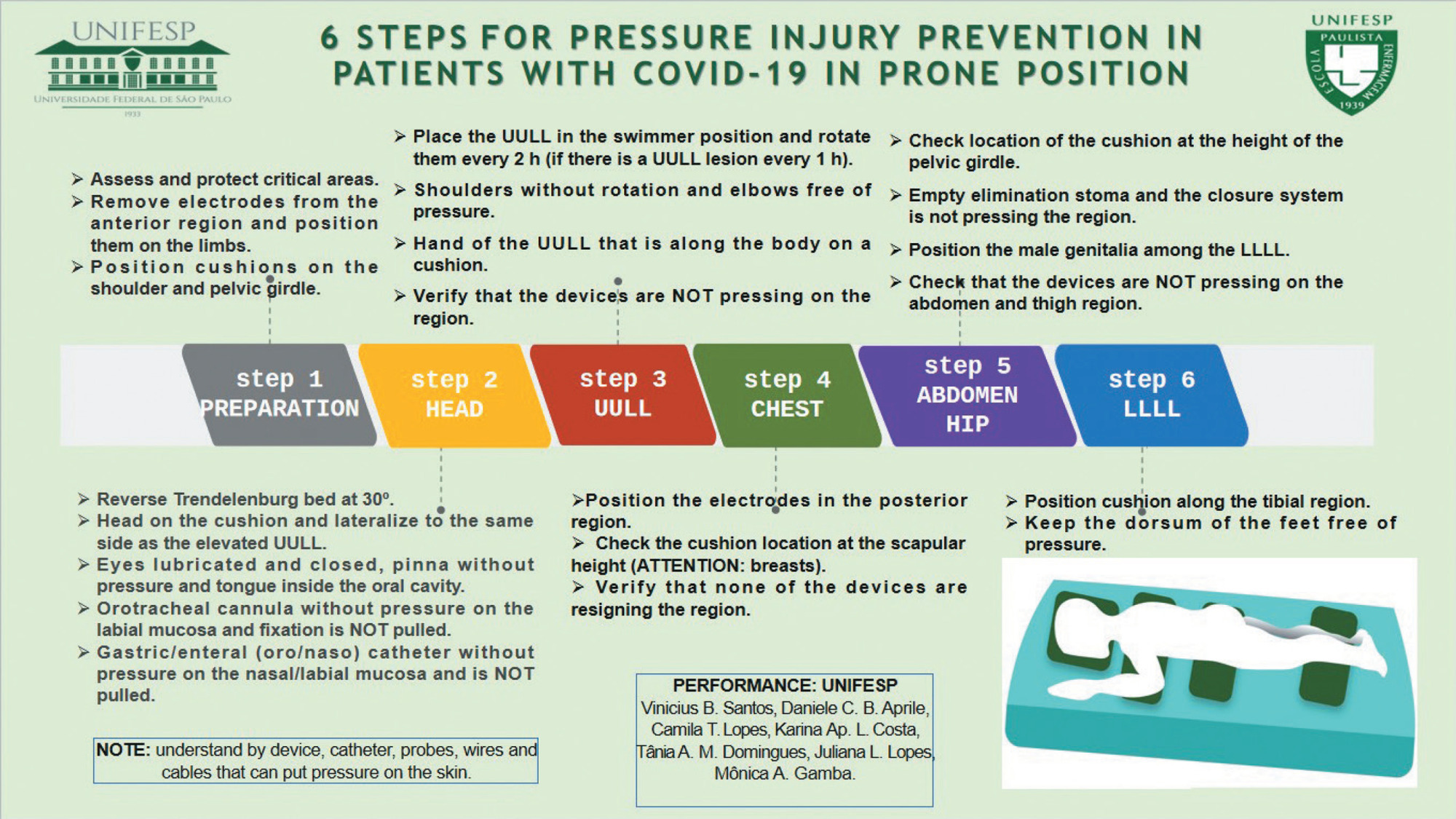
-
02-10-2020
Development of middle-range theories in nursing
Revista Brasileira de Enfermagem. 2020;73(1):e20170893
Abstract
Development of middle-range theories in nursing
Revista Brasileira de Enfermagem. 2020;73(1):e20170893
DOI 10.1590/0034-7167-2017-0893
Views0See moreABSTRACT
Objective:
To identify in the literature how Middle-Range Theories (MRT) are being developed in Nursing.
Method:
Integrative review on the databases Lilacs (Latin American and Caribbean Literature in Health Sciences), Scopus, Cinahl (Cumulative Index to Nursing and Allied Health Literature), Web of Science and PubMed portal, using the keywords middle range theory and nursing, as well its Portuguese correspondents (Lilacs), and the Boolean operator AND. The sample included 25 articles.
Results:
All articles presented concepts related to MRT. Most developed a synthesis picture. Some theories have formulated specific propositions, hypotheses, and names. Only 16 articles cited the methodological framework, while 22 used theories or models for theoretical foundation and 11 carried out literature reviews.
Final considerations:
The development of MRT included the presentation of fundamental concepts, synthesis, propositions, hypotheses and specific name. The MRT is recognized as a way of developing knowledge to guide the nursing practice.
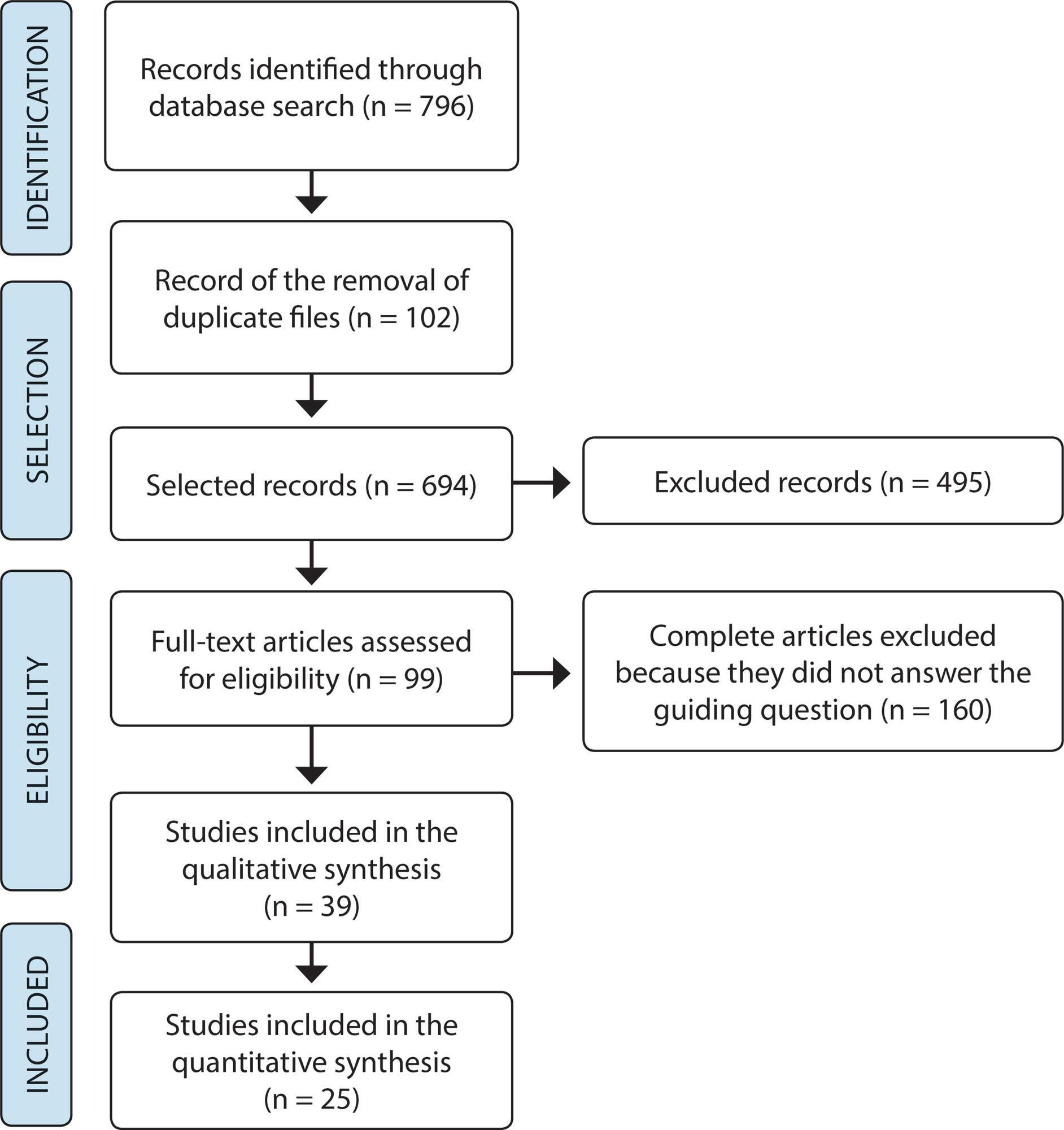
-
09-16-2019
Construct validation: coping with HIV/AIDS in Primary Health Care
Revista Brasileira de Enfermagem. 2019;72(5):1173-1181
Abstract
Construct validation: coping with HIV/AIDS in Primary Health Care
Revista Brasileira de Enfermagem. 2019;72(5):1173-1181
DOI 10.1590/0034-7167-2018-0734
Views0See moreABSTRACT
Objective:
To validate the construct and measure the trustworthiness of a questionnaire aimed at assessing HIV/AIDS coping actions developed by health professionals in Primary Health Care.
Method:
A methodological study carried out with 397 primary health care professionals in two municipalities in the Northeast region of Brazil. The construct validity was developed by the exploratory and confirmatory factor analysis, and the reliability analyzed by the reliability and reproducibility.
Results:
The validation determined six factors retention that composed the six domains of the questionnaire. Internal consistency was 0.91 and quality of the confirmatory analysis adjustment was 0.998 for Goodness of Fit Index. The domains presented Kappa values between 0.833 and 0.997.
Conclusions:
The final questionnaire was composed of 18 items and presented feasibility of application, and potential to evaluate actions for HIV/AIDS control in Primary Health Care.
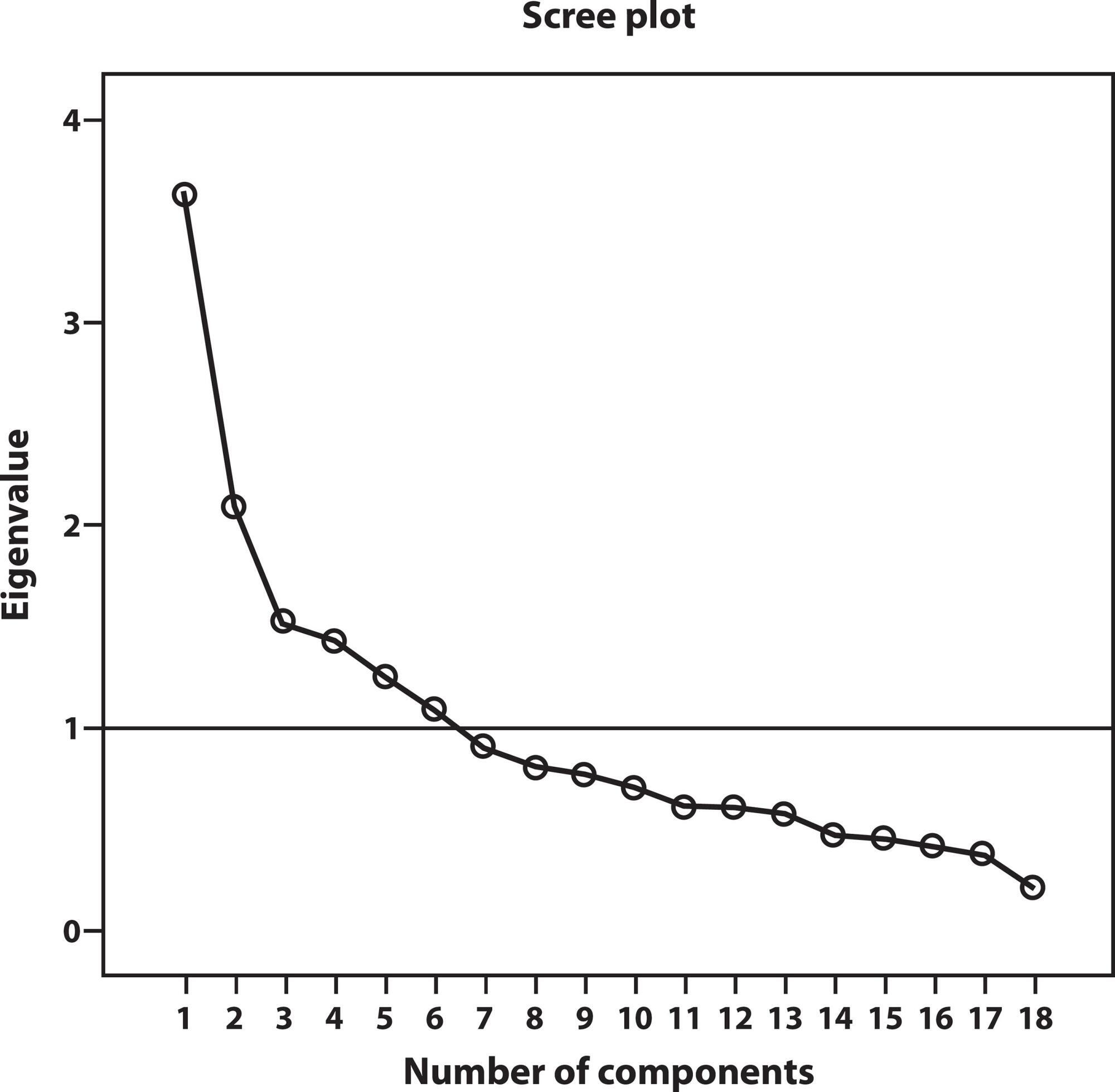
-
ORIGINAL ARTICLE02-10-2020
Stress and health risk behaviors among university students
Revista Brasileira de Enfermagem. 2020;73(1):e20180035
Abstract
ORIGINAL ARTICLEStress and health risk behaviors among university students
Revista Brasileira de Enfermagem. 2020;73(1):e20180035
DOI 10.1590/0034-7167-2018-0035
Views0See moreABSTRACT
Objective:
To analyze the level of stress and its relationship with health risk behaviors among university students.
Method:
Cross-sectional analytical study carried out at a higher education institution in Picos-PI. A total of 377 students were evaluated for socio-demographic and academic variables, stress profile, sleep quality, alcohol use, smoking habits and level of physical activity. The Statistical Package for the Social Sciences (SPSS), version 20.0 was used for data processing and analysis.
Results:
Sleep quality was poor for 65.3% of the subjects, and sleep disturbances were found in 17.0%. Stress was observed in 68.7% of the sample. Stress was associated with the following variables: gender, time in the institution, poor sleep quality.
Conclusion:
Most of the students evaluated present some level of stress associated with poor sleep quality, which is a risk to the quality of life of these individuals.
-
ORIGINAL ARTICLE03-24-2021
Self-care of people with intestinal ostomy: beyond the procedural towards rehabilitation
Revista Brasileira de Enfermagem. 2021;74(1):e20200088
Abstract
ORIGINAL ARTICLESelf-care of people with intestinal ostomy: beyond the procedural towards rehabilitation
Revista Brasileira de Enfermagem. 2021;74(1):e20200088
DOI 10.1590/0034-7167-2020-0088
Views0See moreABSTRACT
Objectives:
to interpret the self-care experience of people with intestinal ostomy registered in an ostomy program, based on the framework of the Social Model of Disability.
Methods:
qualitative exploratory research, with the participation of nine people with intestinal ostomy, based on the Social Model of Disability.
Results:
majority were elderly, married, male with colostomy due to colorectal neoplasia. The self-care of these people was analyzed in two thematic groups: “Interdisciplinary assistance needed for people with intestinal ostomy” and “Self-care for the rehabilitation of the person with intestinal ostomy”. It was proved that there was a need for a specialized health team, offering information on disabilities, teaching self-care and perioperative follow-up.
Final Considerations:
when the social barriers of physical disabilities are overcome in the context of assistance for health and life, self-care will go beyond the reductionist vision of procedural care, towards comprehensive care, favoring the achievement of rehabilitation and the quality of survival.
-
03-19-2021
Production and validation of educational technology on nursing care for syphilis prevention
Revista Brasileira de Enfermagem. 2021;74:e20190694
Abstract
Production and validation of educational technology on nursing care for syphilis prevention
Revista Brasileira de Enfermagem. 2021;74:e20190694
DOI 10.1590/0034-7167-2019-0694
Views0See moreABSTRACT
Objectives:
Validate script and storyboard of a video for educational intervention on nursing care for the prevention and management of syphilis.
Methods:
Methodological design study, with quantitative analysis approach. The content and appearance of the educational video script and storyboard was validated by a committee of experts on the subject and video. They were considered validated from the agreement of 78%, calculated by means of the Content Validity Index.
Results:
There were suggestions, which were analyzed; and, where relevant, the script and storyboard were changed. The degree of agreement among the expert judges on the subject obtained a Content Validity Index (CVI) of 100%, while, with the technical experts in video, all the questions in the educational material obtained the percentage above the recommended minimum of 78%.
Conclusion:
The validated video is an important technological production and could be used in the context of health care.
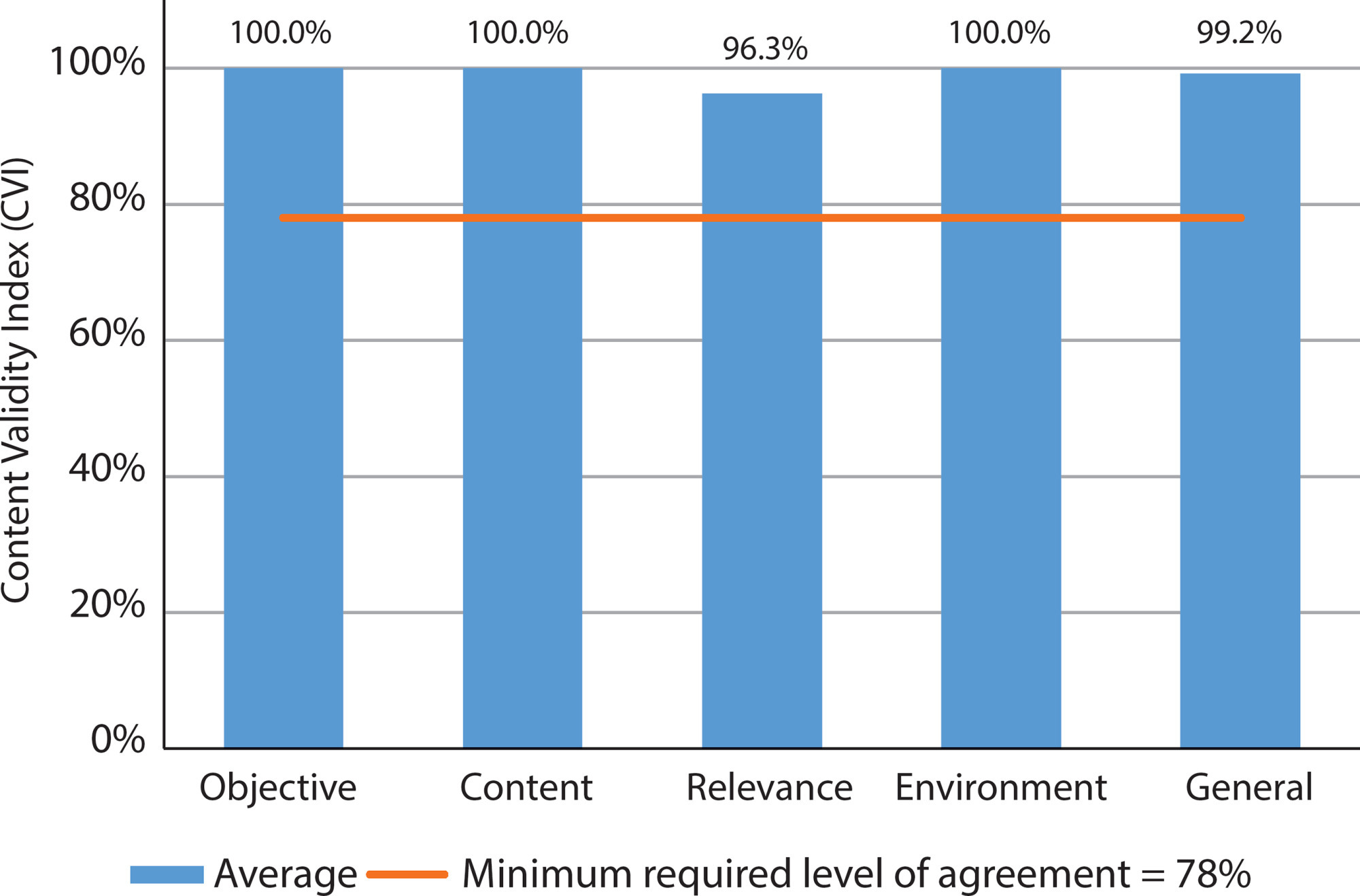
Search
Search in:
Nuvem de Tags
Adolescente (85) Atenção Primária à Saúde (239) COVID-19 (91) Criança (91) Cuidados de Enfermagem (269) Educação em Enfermagem (151) Educação em Saúde (139) Enfermagem (930) Enfermagem Pediátrica (86) Estudantes de Enfermagem (77) Estudos de Validação (131) Família (87) Idoso (208) Promoção da Saúde (99) Qualidade de Vida (104) Saúde do Trabalhador (86) Saúde Mental (145) Saúde Pública (82) Segurança do Paciente (150) Tecnologia Educacional (100)



